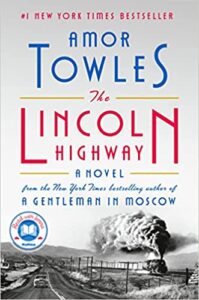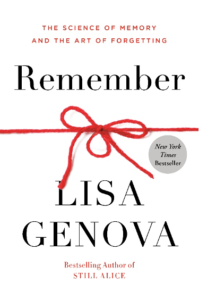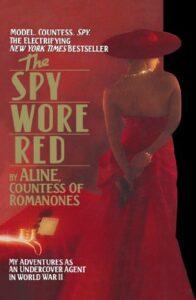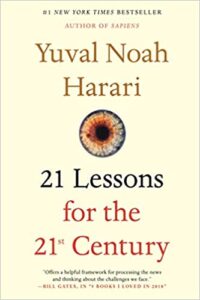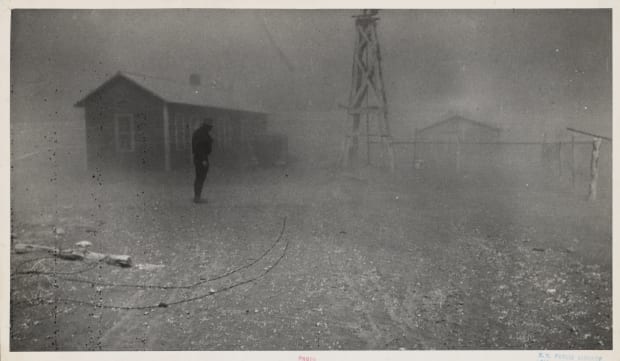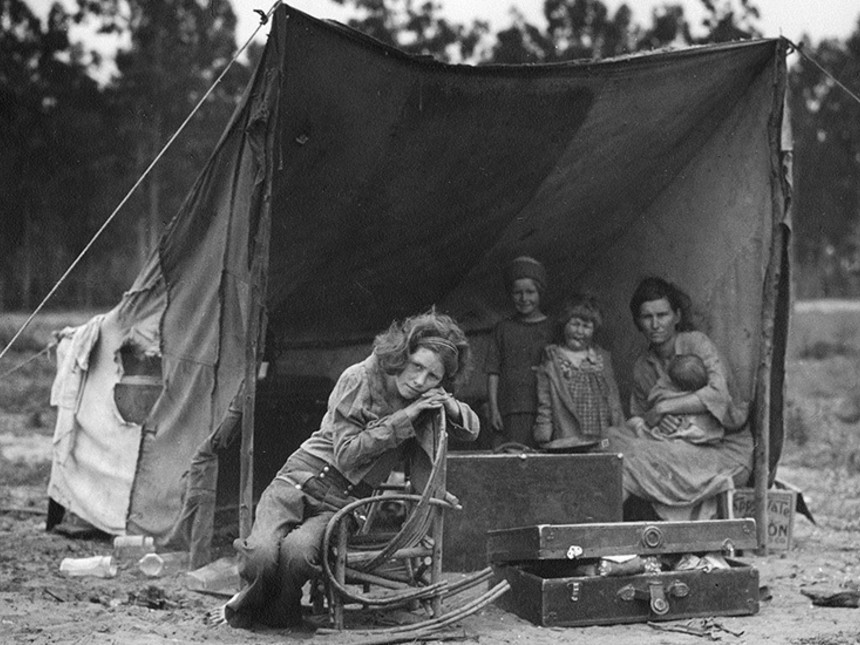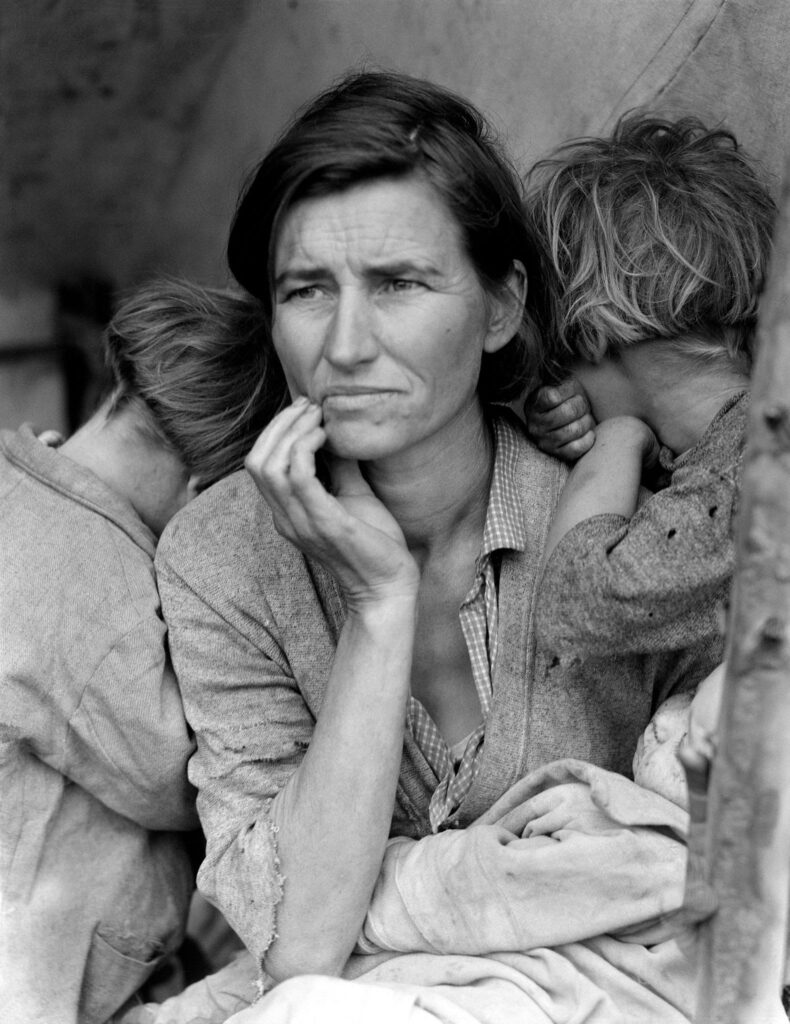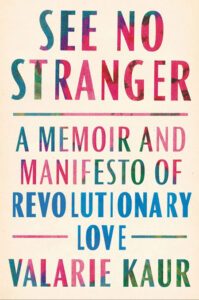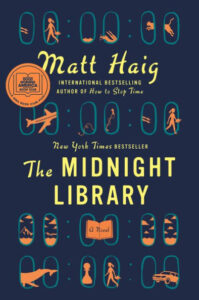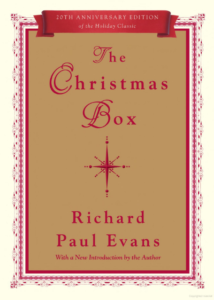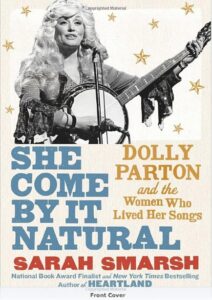The Lincoln Highway
Amor Towles
Viking October 1, 2021
Spanning a period of just 10 days, Amor Towles's new novel is a bit like a Shakespearian play, complete with tragic hero(s), actually several, the eternal conflict of good vs. evil, and a fated outcome. Set in Nebraska in the 1950’s,18-year-old Emmett, a farm boy who is recently released from a correctional facility and his 8-year-old boy-genius brother are determined to find a new life, and their mother who is believed to be in California, after the death of his father and the foreclosure of the family farm. They will do this by way of the Lincoln Highway, the first transcontinental road in the United States. Their route is not direct, nor without adventure.
Towles is an exceptional storyteller who has crafted a beautiful book. By using jargon and phrases, indicative of the1950’s, he creates a deep sense of time and place in a nostalgic America. He is a wordsmith that paints scenes so vivid and descriptive that the reader can easily visualize the story. His choice of characters is perfect. They are charming and contemptuous, thoughtful and inconsiderate, dreamers and delinquents. These memorable characters are unlikely heroes as well as being unexpected villains. Having the story told by the five main characters in alternating chapters provides the needed insight into their behaviors. The author makes the masterful choice of having young Billy read stories of real and mythical heroes from his favorite book, Compendium of Heroes, Adventures, and Other intrepid Travelers by Professor Abacus Abernathe that are aptly woven into the travel “encounters” of the group and moves the story along.
During one of the encounters, Billy is rescued by a wandering boxcar hobo named Ulyssess. Billy asks him, “Were you in a war? Did you sail across the sea? Did you leave a wife and son behind?” Yes, answers Ulyssess. Billy then opens his book and reads of the Great Ulysses' long and perilous journeys on the sea as he attempts to find his way back home and to his family! After closing the book, Boxcar Ulyssess quietly wept.
Perhaps the most remarkable aspect of this book is it is written by the same author who penned The Rules of Civility, and A Gentleman in Moscow. How could three same-authored books be so different? If you have read either of Towles previous books, do not expect the same formal writing style, or confuse this simple story as a liability on the part of the author.
The Lincoln Highway, albeit colloquial, is the work of a skilled and elegant writer.
I give this book 5 Stars!
Remember
Lisa Genova
Harmony Publishing, March 23, 2021
In my younger days, occasionally I misplaced my keys or important papers and had to spend precious minutes looking for them. It was annoying but usually ended with a promise never to do THAT again.
Now that I am of “a certain age,” I freak out when I can’t remember a musical artist from the 80s or the name of a restaurant. As we age, forgetfulness affects us all but it’s not always due to the dreaded dementia or Alzheimer’s.
Dr. Lisa Genova, a neuroscientist, has written a book explaining how we remember, why we forget, and how to strengthen our memory. She manages to lay down bite-size bits of science that a layperson can ingest and illustrates these points by relating to her own life. She is my hero in this regard, as science and I don’t always connect.
This book is a relatively quick read, but the content is fascinating. I enjoyed it so much that after borrowing the ebook I also purchased the hardcover. I know I will read it again!
Chris’s Pick
October 2021
Klara and the Sun
Kazuo Ishiguro
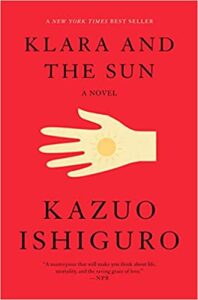 Nobel-prize winning author Kazuo Ishiguro's latest novel, Klara and the Sun, set in the near future, is narrated by Klara, who serves as one child's AF or "artificial friend." Artificial Friends are beings who look like real people but are programmed with artificial intelligence and kept alive by solar-power.
Nobel-prize winning author Kazuo Ishiguro's latest novel, Klara and the Sun, set in the near future, is narrated by Klara, who serves as one child's AF or "artificial friend." Artificial Friends are beings who look like real people but are programmed with artificial intelligence and kept alive by solar-power.
I had heard Ishiguro’s new novel was a masterpiece but, as I am not generally drawn to science fiction, it wasn’t until "Klara and The Sun" appeared on Obama’s Summer Reading List that I decided to take a look and see what the hoopla was about.
I hope you approach the book as I did, knowing nothing about it. Ishiguro presents us with an emerged society replete with a collective jargon used to describe the social order, the meanings of which are foreign to the reader. As the reader delves into the book, a clue, usually in the form of conversation, is dropped into the narrative which suddenly explains a societal term. Oh! I said to myself many times throughout the book as a puzzling term became known.
I found that exciting. If you read reviews of this book that “explain” everything to you ahead of time, I think the magic of your own discovery disappears.
So I am not going to tell you anything more. Except this: it is such an interesting book and well worth the time to read it. I found myself thinking about the book days after I had finished it. And, once you are done, maybe take time to listen to Terry Gross interview Kazuo Ishiguro on NPR’s Fresh Air. It is always fun to hear the author’s viewpoint. But do that last. Read the book first.
The Spy Wore Red
The Spy Went Dancing
By Aline, Countess of Romanones
I often read The WSJ book reviews and this one about this author intrigued me because they are for the most part biographical with a few additions and subtractions. She was an American beauty, a socialite, who wanted to serve the Allied cause. She turned her life around and became a deep cover OSS agent, a SPY!
I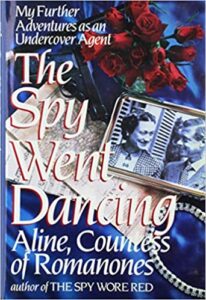 n her first novel, The Spy Wore Red, we find a bored beauty who begins rigorous training and infiltrates the highest level of Spanish society. Five years later, she marries a Spanish Count and becomes one of the most watched, admired, fascinating women of international society. She attends lavish dinners and balls as an undercover agent, and one does feel like one is reading someone’s diary. Madrid has many Nazi spies, and she is there to expose them.
n her first novel, The Spy Wore Red, we find a bored beauty who begins rigorous training and infiltrates the highest level of Spanish society. Five years later, she marries a Spanish Count and becomes one of the most watched, admired, fascinating women of international society. She attends lavish dinners and balls as an undercover agent, and one does feel like one is reading someone’s diary. Madrid has many Nazi spies, and she is there to expose them.
I enjoyed the book so much, I turned to her second novel, written in 1990 which takes place in 1964. To succeed she must recruit a trusted friend whose personal loyalty is unquestioned and whose social credentials are unsurpassed and finds that in the Duchess of Windsor. We are taken from the drawing room to real life harrowing encounters in dark alleyways. Intrigue and adventure. What made the book even more fun were the Spanish festivals, the running of the bulls, toreadors and bullfights that we attended with her. Glamorous, romantic and true.
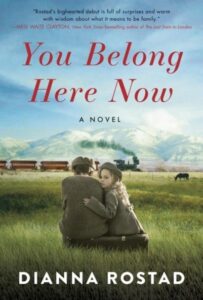 Pete’s Pick
Pete’s Pick
August, 2021
You Belong Here Now
Dianna Rostad
William Morrow Publishing, April 6, 2021
Fiction
Introduction
This book is the debut novel for this author. The novel is set in 1925 and takes place in the Bull Mountain area of Montana. It provides an extraordinary look at the lives of three orphans who left New York City on one of the old orphan trains which were used to try to get orphans adopted by families coming to the various train stations along the route of the train.
Author
Dianna Rostad was born and raised in the Pacific Northwest. Her parents and extended family come from the ranches of Montana and the farms of Arkansas. She raised three children and began writing after they had pretty much grown up. She completed the Southern Methodist University Writers Path program in 2009. A favorite task of hers in writing is the discovery and research of the people and places in which her stories are set.
Story
This story starts at Grand Central Station in New York City as one of the orphan trains of the early 20th Century is being loaded with orphans who the Children’s Aid Society hope to place with families at different stops the train will make as it makes its way across the country. We are introduced to each of the three children as the story opens. One is an Irish boy still learning English who has been orphaned as a result of the Spanish flu. A second child is a tiny little girl who refuses to speak. The third is a young man who lies about his age in order to get on the train and get out of Hell’s Kitchen and the NYC area.
The story progresses as the train makes its way across the country. As it gets out West, it becomes obvious to Charles, the oldest, that the three of them (who have banded together) are not going to be adopted and will be sent back to New York City. As far as he’s concerned, that’s not an option. So, Charles hatches a plan to jump from the train at a point when it has slowed down for turns or other maneuvers. The other two children opt to go with him when he jumps. The children end up on a ranch owned by a family with a tragedy in their past. The parents are now in their 60s and the ranch is being run by their 30-ish spinster daughter whose sole goal in life is to inherit the ranch and keep on being in the cattle business. Having these three children show up completely upsets Nara’s life and she want no part of it. Through the urging of her parents, the three children stay on and Nara runs them ragged. However, the children respond to the environment they are in and the story is filled with fascinating scenarios when the children’s’ past experiences and the family’s past experience with the tragedy that took place years earlier collide and emotions spill out all over. It is a fascinating story of relationships, of the significance of family life, and even the story of forgiveness. You will find yourself taking sides as the story unfolds and ultimately cheering by the end.
Evaluation
This story managed to hook a lot of my emotions in a way which I had not expected. I did not know a lot about the days of the orphan trains, although I have heard about them. Having lived some in the West and being married to a woman whose family comes from the West, I found myself really interested in how the children learned to adapt to their new environment and how they responded to the challenges that they encountered. Dianna Rostad writes with great imagery in her words and has a wonderful way of drawing you in to the emotions behind the story line. I greatly enjoyed her first novel and will look forward to any future works of hers.
Vicki’s Pick (Guest Reviewer)
July 2021
21 Lessons for the 21st Century
Yuval Noah Harari
Random House Publishing
21 Lessons for the 21st Century sounds the alarm for liberal democracy (to date the best form of government) to step up and address our greatest threats: Ecological disaster and Technological disruption. He notes that the merger of biotech & infotech pose novel challenges, and questions whether the 1% who own half the world’s wealth, or stated differently, the richest one hundred people who own more than the poorest four billion, will transform economic inequality into biological inequality. Anyone who finds their smart phone with new unrequested apps and multiple requests to follow their location may well ask Harari’s question, “who owns the DATA?”.
For a lighter read that raises the same questions read Kingsolver’s Unsheltered!
Happy Reading & Joyful Living,
Vicki
Barbara’s Pick
June 2021
Who Is Maud Dixon?
Alexandra Andrews
Published March 2, 2021, Little, Brown, and Company
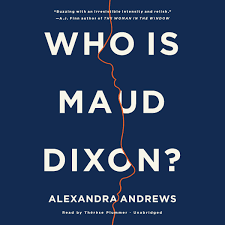 Last time I was in, our librarian reminded me about the pile of Lucky Day Books. This one jumped out, and I’m glad it did!
Last time I was in, our librarian reminded me about the pile of Lucky Day Books. This one jumped out, and I’m glad it did!
The twisty thriller, already headed to Hollywood, is set in the world of publishing. Florence Darrow, in her mid-twenties and feeling stuck in her job and life, miraculously gets the job offer of the year—personal assistant to Helen Wilcox, a best-selling author with the nom de plume of Maud Dixon. When they head to Morocco to do research for “Maud’s” much-anticipated second book, the rollercoaster ride begins.
As Florence types the pages, she notes that the writing is not up to the quality of the first book, so she starts adding and substituting words, satisfying her own writing ambitions.
I don’t want to spoil the thrill, so I’ll stop there—but trust me, this book will keep you guessing until the last page.
Happy reading!
Chris’s Pick
May, 2021
The Four Winds
Kristen Hannah
St Martin’s Press, Published February, 2021
The Grapes of Wrath
John Steinbeck
Published April 14, 1939
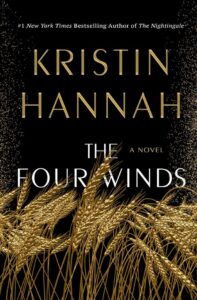 Kristen Hannah’s newest novel is an American story of adversity, desperation, and courage, that begins by enveloping the reader in the hardship of the 1930’s. Coinciding with the Great Depression, eight years of drought, multiplied by damaging agricultural practices, has turned the Southern Plains into a “Dust Bowl”.
Kristen Hannah’s newest novel is an American story of adversity, desperation, and courage, that begins by enveloping the reader in the hardship of the 1930’s. Coinciding with the Great Depression, eight years of drought, multiplied by damaging agricultural practices, has turned the Southern Plains into a “Dust Bowl”.
Elsa Martinelli lives with her husband’s family in the Texas panhandle, and, like thousands of small farm owners, has been struggling to survive as they lose everything to the unrelenting weather, and then to the bank. Her husband has fled the family, leaving Elsa with two small children and his aging parents. At long last, she makes the agonizing decision to leave the farm in search of a better life in California. Leaflets papering the region promise well-paying jobs in the state where it “never gets cold”. They join the migration of hundreds of thousands of people who arrive to claim the same few jobs, and become ever more desperate for work, shelter, and food. The migrant workers are dehumanized, turned away from hospitals and schools, and paid an unlivable wage by the landowners, who knew that there would be hundreds lined up to take any job at any wage.
Kristin Hannah is a masterful storyteller; the tale is harrowing, yet amidst this backdrop of survival the central theme becomes the mother-daughter relationship, often fraught, but always bound by strength and love.
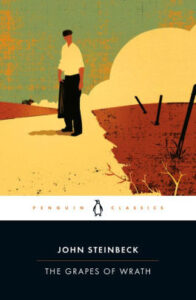 As I read this book, I kept feeling I was reading a story of America today, with our current pandemic, the devastation of climate change, and hundreds of migrants at our border. This is history is repeating itself. Needing and wanting more of the story, I found John Steinbeck’s masterpiece The Grapes of Wrath within my own bookshelf, and settled down to re-read.
As I read this book, I kept feeling I was reading a story of America today, with our current pandemic, the devastation of climate change, and hundreds of migrants at our border. This is history is repeating itself. Needing and wanting more of the story, I found John Steinbeck’s masterpiece The Grapes of Wrath within my own bookshelf, and settled down to re-read.
I don’t know if Hannah means to be a social historian with the Four Winds (although she is), but Steinbeck intended to be; his “social realism” spotlighted how the migrant workers were treated, and begged for societal and government reform. He toggles back and forth between the personal story of the Joad family and the collective story of the migrants.
"How can you frighten a man whose hunger is not only in his own cramped stomach but in the wretched bellies of his children? You can't scare him — he has known a fear beyond every other."
The need for simple human dignity becomes a dominant theme, found in the family ties, friendship, and nuanced relationships within the migrant group. As with Hannah’s book, the strongest character in The Grapes of Wrath, though written from a male perspective, is a woman.
Ma Joad: "She seemed to know that if she swayed the family shook, and if she ever really deeply wavered or despaired the family would fall, the family will to function would be gone."
I found this book even more compelling now that I am older, with a more panoramic view of life. What hasn’t changed is how beautifully Steinbeck writes: he is a visual writer, a painter almost. It is easy to get lost in his words, and to share his fury.
Both of these books, one new, one an American classic, deserve to be read.
Vicki’s Pick (Guest Reviewer)
April, 2021
See No Stranger
Valarie Kaur
Published by Random House, June 2020
See No Stranger is a timely, insightful book.
The author leads the way forward in this pluralistic country that struggles to find the balance between fulfilling the American dream of freedom and opportunity, and respecting diverse perspectives.
She advocates deep listening and understanding the “other” person’s story, noting that “listening does not grant the other side legitimacy, it grants them humanity and preserves our own”.
She has walked the walk, not just talked the talk.
Happy Reading
The Midnight Library
Matt Haig
Published by Viking - September 29,2020
Author Matt Haig, writes an imaginative, thought-provoking novel about regrets and the choices we make in our lives . The genre of the book is a clever cross between Literary Fiction and Science Fiction ( with a touch of fantasy)!
With a title as intriguing as The Midnight Library, I needed to place this book on my “must read list”. Reading page one, confirmed my choice.
Nineteen years before she decided to die, Nora Seed sat in the warmth of the small library at Hazeldene School in the town of Bedford. She sat at a low table staring at a chess board.
“Nora dear, it’s natural to worry about your future”, said Mrs. Elm, the librarian, her eyes twinkling. Mrs. Elm made the first move . A knight hopping over a neat row of white pawns… “With brains like yours, you could do anything”.
Fast forward, nineteen years. Nora Seed is now a woman in her mid-thirties who is both financially and emotionally struggling. Nora believes herself to be incapable of successfully maneuvering through life, and with the seemingly tragic death of her cat, Nora commits suicide. Nora awakes to find herself in the Midnight Library, a place somewhere between life and death where all the shelves are filled with books that address Nora’s regrets and the life paths not taken. To help guide her through the never ending volumes is Mrs. Elm, her high school librarian, the most supportive person in Nora’s life. She explains the “rules” of the library. One regret at a time can be relived, and the decision to stay in that life or leave for another version would be final. Once abandoned, that book of regrets will disappear and another of the infinite books of choices would be available.
For this reader the story begins here. Imagine being able to rethink, redo, and revisit a situation such as, missing an appointment, ignoring a troubled friend, or making a spontaneous decision in one’s life that may have produced a very different outcome. What would we discover? Would we take the path laid out in our Midnight Library book? Would we be better for it? Would we ignore what we experienced and move on to the next volume of regrets which may be more or less of what we would hope?
The Midnight Library is most likely best enjoyed by the reader who is interested in thinking about life’s limitless possibilities and fantasizing about their own “what ifs?” I took this message to heart and re-examined my own (pretty great) life. Yes, there were a few decisions I would have liked to erase, and yes, there were a few experiences I wish I could reclaim. What about you?
Pete’s Pick
February, 2021
The Christmas Box
Richard Paul Evans
Simon & Schuster, 1995
Introduction
This book is the story of a father’s love for his daughters that was never intended to be published. It was to be merely shared with his daughters so that they would one day understand his love for them. Because he made copies for his expanded family, it got shared. The result was an international best-seller.
Author
Richard Paul Evans is a former advertising executive who wanted to create an expression of his love for his two daughters through the telling of a story in book form. It would be something they could go back to and read again, even after having their own children. Little did he know the story would capture the hearts of millions around the world and become a best-seller. He now writes full time and has nearly four dozen books to his credit.
Story
The Christmas Box is a captivating story of a young family (father, mother, three-year-old daughter) who move in with a widow in a mansion in a well-to-do neighborhood in the Salt Lake Valley area. The widow needs a live-in family to provide daily meals, cleaning, laundry, and yard maintenance as she in not capable of doing those things on her own any longer. The story follows the family (Richard, Keri, and Jenna Evans) as they take up residence and begin a wonderful relationship with MaryAnne Parkin. She is an elderly woman, set in her ways, but with a keen eye on watching this young family living with her. She is particularly interested in Jenna, the three year old daughter.
During move-in day, Richard and his brother-in-law are moving most of Richard and Keri’s old furniture up into the attic because it is not needed in their furnished wing of the mansion. As they are moving things around in the attic to make room for the furniture storage, Rick finds a beautiful old wooden box with an intricate carving of a Nativity scene on the cover of the box. He admires the box and he and Barry finish the process of storing the old furniture. As the story progresses, the Evans settle into life in the mansion and Richard settles in to his life as a partner in a new formal wear rental business. They enjoy the interactions with Mary Parkin and she takes an interest in their family life. Rick’s business gets busier and he finds himself frequently occupied with work that he brings home, or ends up staying late at the business. Mary periodically urges Rick to spend time with his daughter Jenna. To hold her. To tuck her in at night. To read to her. She’s very kind in how she does this, but is fairly insistent on the importance of Rick’s spending time with his daughter.
As it gets towards Christmas, Rick begins to have dreams. They are the same each time. He finds himself in the middle of a large, open field with beautiful sounds of music filling the air. As he looks up, he sees an angel with outspread wings descending from heaven. As the angel gets close to him, he looks at it and the angel’s eyes roll up and the angel turns to stone. This happens several times. Then, one night the dream is much more vivid and the music more alive. He awakes thinking that the dream will go away, but he continues to hear the music. He realizes the music is coming from someplace in the house and he gets a flashlight and tries to follow the sound. He discovers that the music is coming from the attic and he goes into the attic and discovers the music is coming from the Christmas box he had found the day they moved in to the mansion. He examines the box looking for a key or a mechanism for the music, but finds none. Finally he opens the box and the music stops. Inside he finds a letter that is decades old. He reads the letter and it is written as a love letter to someone called Beloved One. He puts everything away and goes back to bed and shares the episode with Keri in the morning.
The story goes on to tell the tale of Mary’s bout with a brain tumor, the Evans family’s adventure of going through Mary’s illness with her and finding out about the importance of the angel in Richard’s dreams. Through it all, Mary asks Richard if he understands what the first Christmas gift was. Richard guessed at a number of answers, but by the end of the story, he finds out the real meaning of Christmas and the message Mary has been trying to give him.
Evaluation
The story is captivating and is easily read in an evening or two. Its message is incredibly powerful. When Richard Paul Evans first wrote it, it was basically a love story for his daughters. He made 20 copies for his extended family just to share it. However, it got shared around and all of a sudden there were requests coming from all over for copies of the story. In 1995, the book made history by being the first book ever to make #1 on the New York Times best seller list in both hardback and paperback simultaneously. It has now sold over 8 million copies. After reading the book, find a copy of Timepiece and read it. It will tell the story behind the story of The Christmas Box. I highly recommend both.
Barbara’s Pick
January 2021
She Come by It Natural
Sarah Smarsh
If anyone came out of 2020 smelling like a rose, it had to be Dolly Parton. She was everywhere by the end of the year thanks to a new Christmas recording and holiday TV special and a coffee table tome on a few of her 3,000+ songs. This book, originally written as a four-part magazine series, is all about Dolly Parton and her relationship with her people—the women whose causes she has championed her entire life.
Smarsh’s first book, Heartland: A Memoir of Working Hard and Being Broke in the Richest Country on Earth, was a finalist for the 2018 National Book Award. (If you haven’t read it, please do. It’s an eye opener.) Her Grandma Betty, a fan favorite, appears in She Come by It Natural as one of the women who let Dolly speak for her. Parton does not label herself as a feminist, but her songs speak for the marginalized and silent. She leads by example when she overturns the status quo, escapes male “mentorship,” and becomes a philanthropist. The contrast of Parton’s story with Smarsh’s personal connection is compelling.
This book is a relatively quick read, but I promise it is worth it. I dare you not to be humming a Dolly tune by the end!
